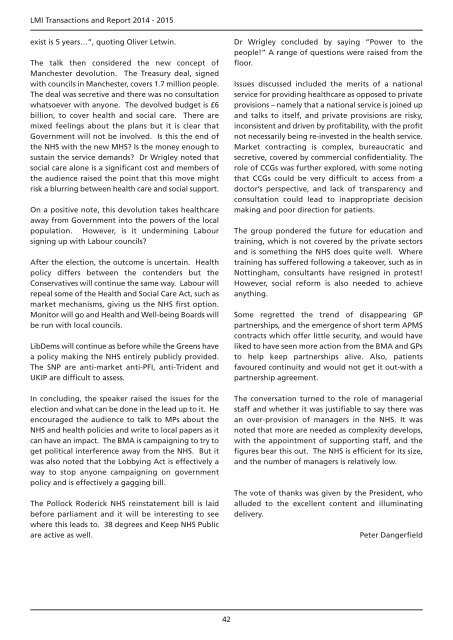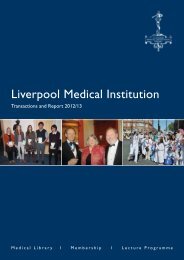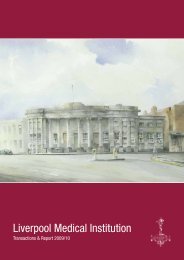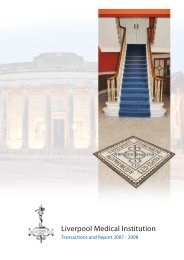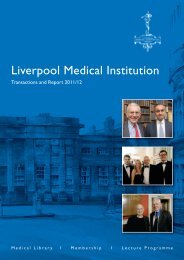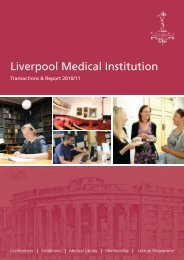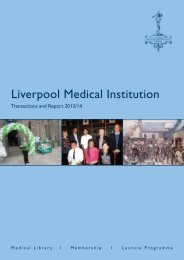LMITransactions&Report2014-15
Create successful ePaper yourself
Turn your PDF publications into a flip-book with our unique Google optimized e-Paper software.
LMI Transactions and Report 2014 - 20<strong>15</strong><br />
exist is 5 years…”, quoting Oliver Letwin.<br />
The talk then considered the new concept of<br />
Manchester devolution. The Treasury deal, signed<br />
with councils in Manchester, covers 1.7 million people.<br />
The deal was secretive and there was no consultation<br />
whatsoever with anyone. The devolved budget is £6<br />
billion, to cover health and social care. There are<br />
mixed feelings about the plans but it is clear that<br />
Government will not be involved. Is this the end of<br />
the NHS with the new MHS? Is the money enough to<br />
sustain the service demands? Dr Wrigley noted that<br />
social care alone is a significant cost and members of<br />
the audience raised the point that this move might<br />
risk a blurring between health care and social support.<br />
On a positive note, this devolution takes healthcare<br />
away from Government into the powers of the local<br />
population. However, is it undermining Labour<br />
signing up with Labour councils?<br />
After the election, the outcome is uncertain. Health<br />
policy differs between the contenders but the<br />
Conservatives will continue the same way. Labour will<br />
repeal some of the Health and Social Care Act, such as<br />
market mechanisms, giving us the NHS first option.<br />
Monitor will go and Health and Well-being Boards will<br />
be run with local councils.<br />
LibDems will continue as before while the Greens have<br />
a policy making the NHS entirely publicly provided.<br />
The SNP are anti-market anti-PFI, anti-Trident and<br />
UKIP are difficult to assess.<br />
In concluding, the speaker raised the issues for the<br />
election and what can be done in the lead up to it. He<br />
encouraged the audience to talk to MPs about the<br />
NHS and health policies and write to local papers as it<br />
can have an impact. The BMA is c<strong>amp</strong>aigning to try to<br />
get political interference away from the NHS. But it<br />
was also noted that the Lobbying Act is effectively a<br />
way to stop anyone c<strong>amp</strong>aigning on government<br />
policy and is effectively a gagging bill.<br />
The Pollock Roderick NHS reinstatement bill is laid<br />
before parliament and it will be interesting to see<br />
where this leads to. 38 degrees and Keep NHS Public<br />
are active as well.<br />
Dr Wrigley concluded by saying “Power to the<br />
people!” A range of questions were raised from the<br />
floor.<br />
Issues discussed included the merits of a national<br />
service for providing healthcare as opposed to private<br />
provisions – namely that a national service is joined up<br />
and talks to itself, and private provisions are risky,<br />
inconsistent and driven by profitability, with the profit<br />
not necessarily being re-invested in the health service.<br />
Market contracting is complex, bureaucratic and<br />
secretive, covered by commercial confidentiality. The<br />
role of CCGs was further explored, with some noting<br />
that CCGs could be very difficult to access from a<br />
doctor’s perspective, and lack of transparency and<br />
consultation could lead to inappropriate decision<br />
making and poor direction for patients.<br />
The group pondered the future for education and<br />
training, which is not covered by the private sectors<br />
and is something the NHS does quite well. Where<br />
training has suffered following a takeover, such as in<br />
Nottingham, consultants have resigned in protest!<br />
However, social reform is also needed to achieve<br />
anything.<br />
Some regretted the trend of disappearing GP<br />
partnerships, and the emergence of short term APMS<br />
contracts which offer little security, and would have<br />
liked to have seen more action from the BMA and GPs<br />
to help keep partnerships alive. Also, patients<br />
favoured continuity and would not get it out-with a<br />
partnership agreement.<br />
The conversation turned to the role of managerial<br />
staff and whether it was justifiable to say there was<br />
an over-provision of managers in the NHS. It was<br />
noted that more are needed as complexity develops,<br />
with the appointment of supporting staff, and the<br />
figures bear this out. The NHS is efficient for its size,<br />
and the number of managers is relatively low.<br />
The vote of thanks was given by the President, who<br />
alluded to the excellent content and illuminating<br />
delivery.<br />
Peter Dangerfield<br />
42


